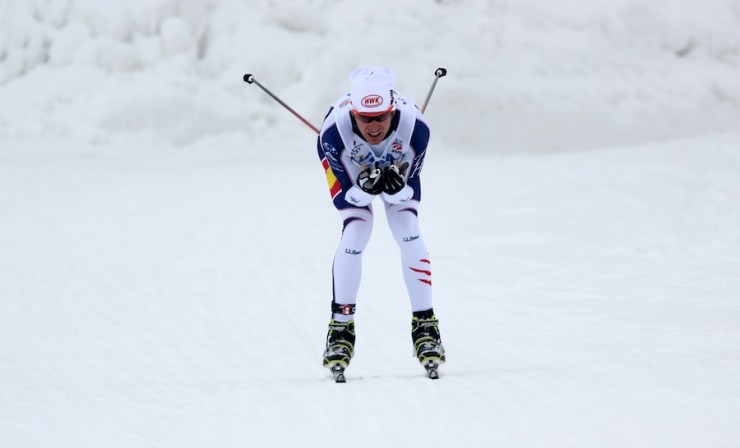
FasterSkier’s coverage of the 2014 U.S. Cross Country Championships is brought to you through the generous support of The Memory Clinic in Bennington, Vt.
***
Note: This article has been updated to include Sylvan Ellefson’s tribute to Vail native, Tony Seibert, who died in an avalanche on Tuesday.
MIDWAY, Utah – Ninety percent of people holding homemade signs and placards along the trails at Soldier Hollow on Wednesday at the U.S. Cross Country Championships were for one person: Sylvan Ellefson.
And it wasn’t just all of Vail, Colo., out there supporting him. Ellefson, 26, had fans, friends and family from Alaska, Wyoming and Minnesota in bunches along the 5-kilometer Olympic course, all screaming his name throughout the 30 k freestyle mass start.
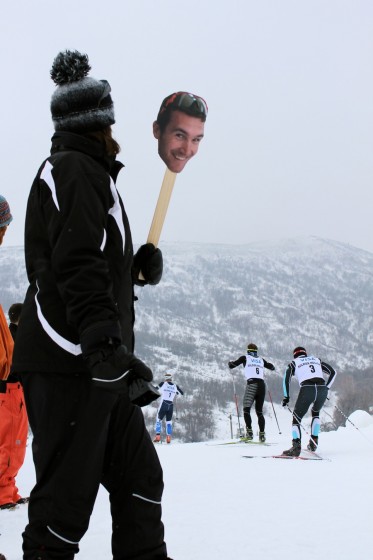
A Ski & Snowboard Club Vail (SSCV)/Team HomeGrown staple, Ellefson figured he had about 40 to 50 supporters cheering him on, but it could’ve easily been more. Many of his fans held “Sylvan on a Stick” cardboard cutouts of his face in hand, including his mother-in-law who excitedly awaited him (along with his grandmother and other family members) at the finish.
With two laps remaining, Ellefson kicked it into high gear on the first of several significant climbs on a snowy morning. Distancing himself from Miles Havlick of the Sun Valley Ski Education Foundation (SVSEF) and Ben Lustgarten (Middlebury), he tried to close the gap on renegade Scott Patterson of the University of Vermont (UVM).
“I knew that if I wanted to win today I had to pull a ballsy move and I was feeling pretty good chasing Scott,” Ellefson said. “I decided that I’d see what the field was gonna do and just go for it. I went for it and not everyone responded the way I thought, so I just kept going for it.”
On the second of six times up the unforgiving Hermod’s Hill in condensing powder, Patterson and Lukas Ebner (University of Alaska-Anchorage) took advantage of the pack’s moderate pace and put some time between them and the rest of the field.
“Next time up the hill [Ebner] faded a little bit so then all of a sudden I was up there on my own,” said Patterson, an Anchorage native. “I figured I’d try to ski it, try to stay relaxed, but out there being off the front I definitely probably pushed a little too hard early.”
After skiing 1 ½ laps alone out front with as much as a 30-second margin, the UVM junior started the fifth lap hanging onto whatever energy he had left. He made it up the first two climbs out of the stadium to the backside of the course, where Ellefson reeled him in – cutting the deficit from 15 seconds to zero within a kilometer.
“I was hurting pretty bad,” Patterson said. “The steep hills really got me and I was almost walking up them. Sylvan came flying by me and I had nothing really left at that point, so I was kind of struggling in the last 10 k.”
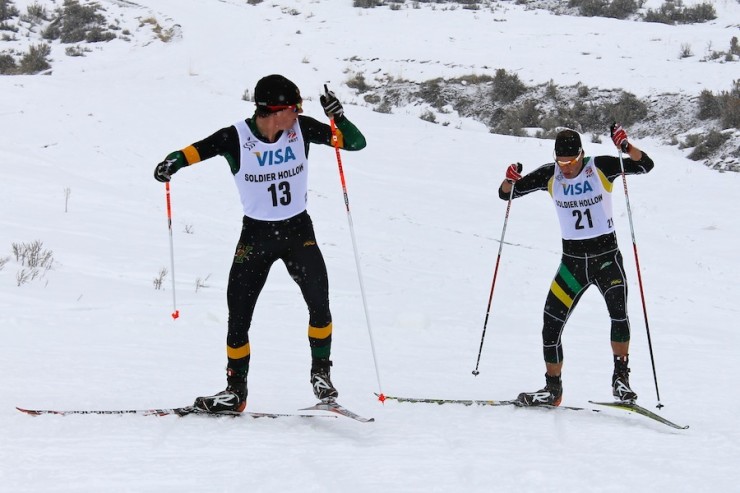
Ellefson not only passed him, but he dropped the pack in the process and created a gap of his own with 7.5 k remaining. A 10-second lead down the long downhill known as Whale’s Tale grew to 12 seconds on the final hill of the lap, and Ellefson came through the stadium 11.6 seconds ahead with 5 k to go.
Hearing things weren’t going so well for Kris Freeman of the Maine Winter Sports Center in second (“Something was going on with his ski, his binding,” Ellefson said), he decided to go for it with one lap remaining.
“I haven’t really tried to pull a ballsy move in a long time and I figured why not?” he said. “My skis today were also unbelievable.”
He ended up extended his lead to 23 seconds across the top of the course before heading up Hermod’s one last time. Ten to 20 seconds later on the same hill, Brian Gregg (Team Gregg/Madshus) challenged Freeman for second and gave Ellefson a scare in first.
“I was coming completely undone up Hermod’s the last time, completely,” Ellefson said. “My coach was telling me I had about 10 seconds coming up Hermod’s and I was like, ‘Oh my God, somebody give me a break,’ but when you have this good a field you just have to be the fastest on that day.”
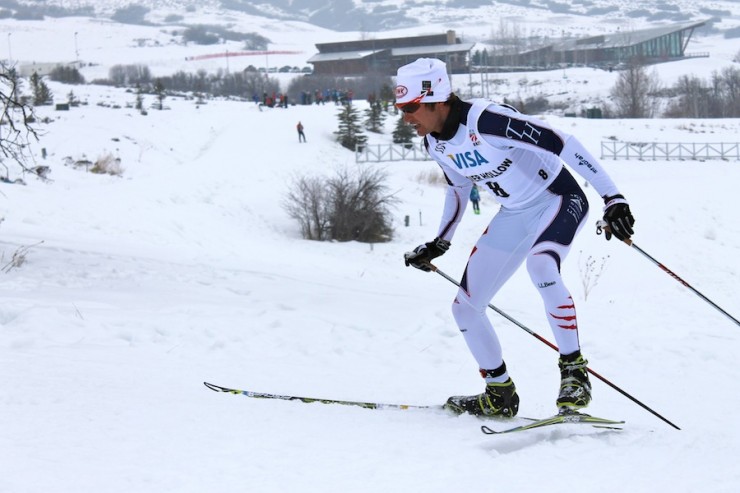
He was – outlasting Gregg, who came on strong over the last two climbs, to win his first national title in 1:19.11.3. Gregg finished 2.8 seconds back in second for his first national podium, and Freeman pulled through in third, 16.5 seconds after Ellefson.
“Everything was so blurry,” Ellefson recalled of the last few hundred meters to the finish. “I knew Gregg was coming, but I didn’t know how far behind he was and I knew I just had to hammer. I can’t tell you how many times Brian Gregg and I have had a sprint to the finish. Last year, he got me every single time so I was happy to get him this time.”
In last year’s national 30 k classic, Ellefson placed seventh, 35 seconds behind winner Torin Koos (Bridger Ski Foundation), who did not finish after pulling out in 42nd halfway through the race. Another DNF, Tad Elliott (SSCV/Team HomeGrown) led early in his first race back while recovering from mono. He was in the mix and near the front for three laps, but called it a day after the fourth time around despite being in 16th.
Almost exactly a year ago, Gregg was 22nd in the 30 k classic mass start, also at Soldier Hollow. On Wednesday, he was out to perform in what he considered his focus event of this year’s nationals – and the one with the deepest implications for making the Olympics next month in Sochi, Russia.
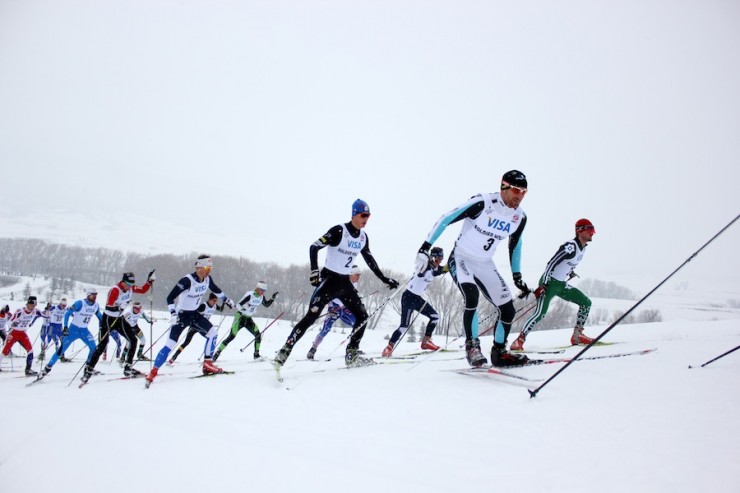
“On Hermod’s, I was getting a little bit of a gap on Kris and I was like, ‘I’ve just got to finish as hard as I can,’ ” said Gregg, 29, who sat patiently in the pack in 24th through the halfway point.
A lap later, he was up to 12th, and after the fifth of six laps, Gregg was fourth behind Ellefson, Freeman, and his good friend Matt Liebsch (XC United/Team StrongHeart).
“It was kind of nice to have that rabbit up there because I kept gaining time on Sylvan,” Gregg said of chasing Ellefson the last kilometer to the finish. “But I was really tired and it felt kind of like a slow-motion sprint.”
Regardless, second place and just 2.3 seconds out of first was almost as good as a victory for Gregg, who’s been hunting to improve his International Ski Federation (FIS) point profile since the beginning of the season.
In the following women’s 20 k mass start, his wife Caitlin Gregg won by more than 3 ½ minutes. Less than four hours later, they two were scheduled to fly from Salt Lake City to Prague.
“The last two days have been crazy,” Gregg said. “Packing things up making sure we’re as dialed as we can be for this race. … We’re not really sure how long we’ll be over in Europe; we have a ticket back on [January] 21st, but maybe with today we get named [to the U.S. Olympic team] or whatever, so we’ll see how it works.”
The men’s and women’s SuperTour leaders, the couple earned World Cup starts for the next two weekends of racing before the Olympics, which start Feb. 8.
“Very, very excited,” Gregg said. “This has been a focus race all season. … It’s great to see Sylvan up top. He’s been real consistent all season.”
A day after his friend and Vail native, Tony Seibert, 24, died in an avalanche, Sylvan Ellefson dedicated Wednesday’s U.S. nationals 30 k freestyle race to him.Ellefson wrote on Facebook on Tuesday:
“Having a tough time swallowing this one. I’ll be skiing for you tomorrow Tony! The Vail community won’t be the same without you. I’ll celebrate your life by attempting a 360 off of Lovers Leap. Doubtful I’ll land, but at least I’ll be smiling when Ski Patrol takes me off the mountain I’ll miss you man!”
“Whether they pick me for the Olympics this year or not, I’m just happy to have a national championship under my belt,” Ellefson said. “It’s literally the only thing I’ve ever wanted in my skiing career, and two years ago when I was third [in the 2012 national 15 k freestyle], that was the closest. So for me to get it today, I can’t tell you how happy I am.”
Moments before he stepped up onto the podium for the medal ceremony, he embraced his wife, Sarah.
“To have this support crew here is unbelievable,” Ellefson said. “That’s really what got me up the hills today.”
Almost 14 seconds after Gregg finished, Freeman, 33, came through in third.
“I did what I had to do, right?” Freeman said to his coach, Zach Caldwell, almost immediately after.
While he declined to comment, Freeman later wrote on his blog that he was seeking lower than 30 FIS points in both distance races at nationals, which meant making the podium in both. He was third in the 15 k classic last Saturday.
“I just managed a 29.5 FIS race in the 15k classic and I scored a 27 point race in the 30k skate today,” he wrote. “I have not been feeling good this week so I am relieved to have moved up into such a strong position. As far as I know there are no more FIS races in the US that could affect the Olympic qualification for distance races.”
A Type-1 diabetic, his blood sugar dropped dangerously low to 38 the night after the 15 k. He overcompensated and his glucose level rose as he slept, waking him up four times with a peak of 280 at 4 a.m.
“At this point I took yet another bolus and forced myself to get out of bed and do 200 jumping jacks in order to make my muscles more receptive to the insulin I was giving myself,” Freeman wrote. “The physical stimulus worked and I slept until 8:00 AM when my low alarm set off at 78. For me, seventy eight is a healthy level but below 70 is not. So I got out of bed, ate breakfast, and everything stabilized. This was not the ideal recovery for a race and I started feeling very down.”
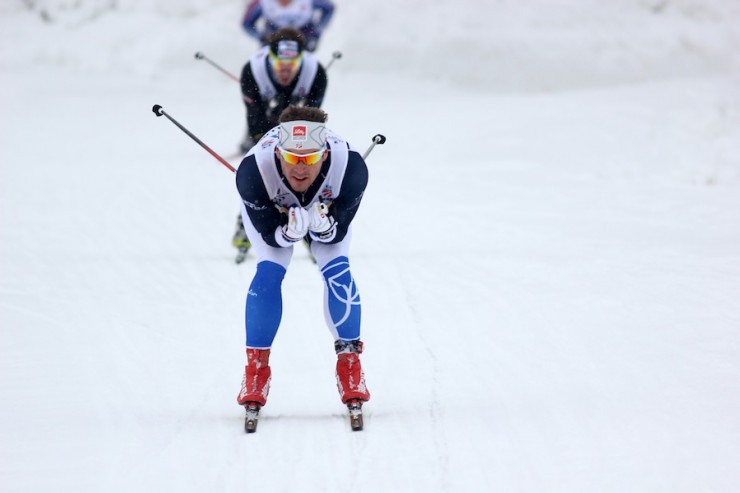
He called his sport psychologist, who “helped me to let go of the unquantifiable fatigue that the poor sugars caused and to focus on what had to be done in the next race. I have a tendency to be very obsessive so that was easier said than done,” Freeman wrote. “I have to thank my family and girlfriend who also got to listen to me whine about not feeling like myself the last few days. [Their] love and encouragement really helped me to get the most out of a less than ideal time and get the points I needed to pursue my Olympic dream in Sochi. I am very confident that with a little downtime at home that my best Olympic results are in front of me.”
While he and several others signed eligibility papers for Sochi, the team won’t be officially named until around Jan. 21-22, according to the U.S. Ski Team.
Forty-two and a half seconds off the podium, Mikey Sinnott (SVSEF) came on strong the last lap to finish fourth. Unable to keep up with Gregg through the stadium at the start of the last lap, he caught a ride from Erik Bjornsen and Lex Treinen, both of Alaska Pacific University. He conserved behind them and passed them both before the infamous climb, where he also took on Liebsch.
Bjornsen finished another six seconds back in fifth, 1:05 behind Ellefson. Treinen was sixth (+1:07.3) and Liebsch took seventh (+1:12.5).
“I kind of got lucky that I didn’t have to sprint too hard; this was a pretty tough finish for me,” Sinnott said. “Last hundred meters with my legs gone, I was lucky to be alone.”
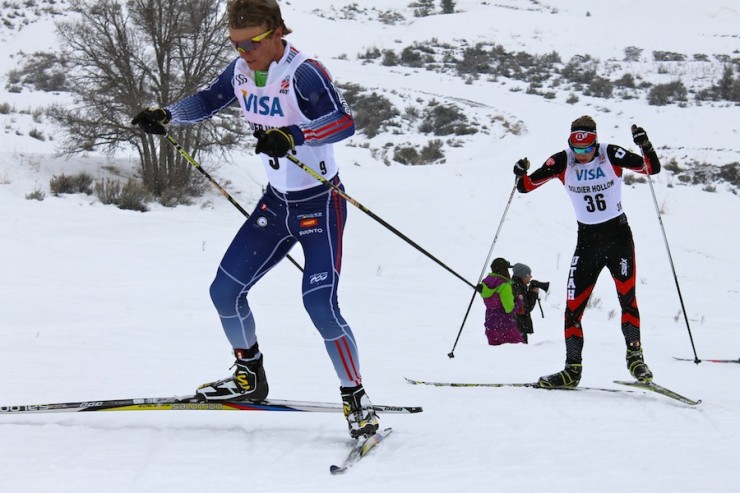
Right behind Ellefson when he popped early in the fourth lap, Sinnott rose as high as third, but generally hovered in the top 10.
“I haven’t really skied well at all this year so I knew that maybe my form wasn’t the top notch, but I know I probably have some better base than a lot of these youngsters out there,” Sinnott said. “I wanted to ski smart and hope for the best. I think that’s what I did well, stay near the front out of the chaos.”
It worked to his advantage, he said, because, “This is one of the slowest 30 k’s I’ve been in. The first 20 k we were doddling. I’m sure Caitlin went a lot faster than us. I just kind of sat there patiently and waited for it to start blowing apart.”
While Patrick Johnson (Far West) was the first to go off the front with a breakaway on the first lap, Sinnott said he wasn’t too concerned.
“It was kind of like, ‘That was dumb,’ ” Sinnott said. “Maybe if we were pushing and working hard and not reeling him in, but you could tell he was just strung out there working hard and we were taking it really easy. … Patterson did the same thing and I think the coaches started to panic because he was a little farther and a little bit longer out there, but … when the race finally started we reeled him in a k.
“When you’ve got Freeman in the pack you know he’s not gonna let anyone get out of hand that’s really a threat,” he added.
After opening up a 15-second lead early in the first lap, Johnson resumed his place in the pack about halfway through the second loop and finished 12th, 1:34.6 behind Ellefson. Patterson ended up 19th (+2:20.6).
“I gave it my best. Put in a good effort,” Patterson said.
Bjornsen was disappointed with fifth, explaining he was looking for more after feeling “pretty nervous” at the start.
“I should’ve gone with those guys on the last lap, but I guess I just didn’t quite have it in me,” he said of Ellefson, who made the break with about 7.5 k to go, and Freeman, Liebsch and Gregg that followed in pursuit.
Liebsch said he felt good for five of the six laps, but couldn’t quite stay with Gregg when he attacked on the last lap.
“I just didn’t have it right then,” Liebsch said, who had snow jam under his boot for the entire last lap, causing some discomfort with his binding.
“We’ll have to see how the points play out, if I’m still in it for Sochi or not,” he added. “I was right in the mix for making the world champs last year … and seeing [how] the last Olympic team I was right there, so hopefully get the nod this time.”
Thinking about his Midwest supporters, Liebsch thanked his wife, Marybeth. “I love her and thanks to everyone back home for the support,” he said.
Results | Complete U.S. nationals results
— Lander Karath contributed reporting
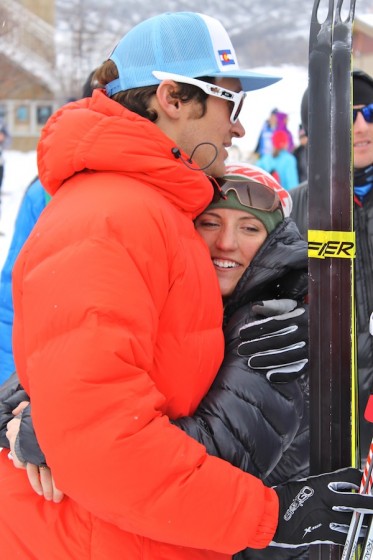
Alex Kochon
Alex Kochon (alexkochon@gmail.com) is a former FasterSkier editor and roving reporter who never really lost touch with the nordic scene. A freelance writer, editor, and outdoor-loving mom of two, she lives in northeastern New York and enjoys adventuring in the Adirondacks. She shares her passion for sports and recreation as the co-founder of "Ride On! Mountain Bike Trail Guide" and a sales and content contributor at Curated.com. When she's not skiing or chasing her kids around, Alex assists authors as a production and marketing coordinator for iPub Global Connection.



